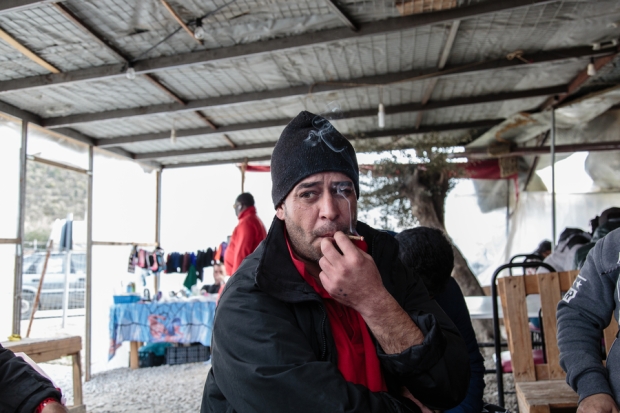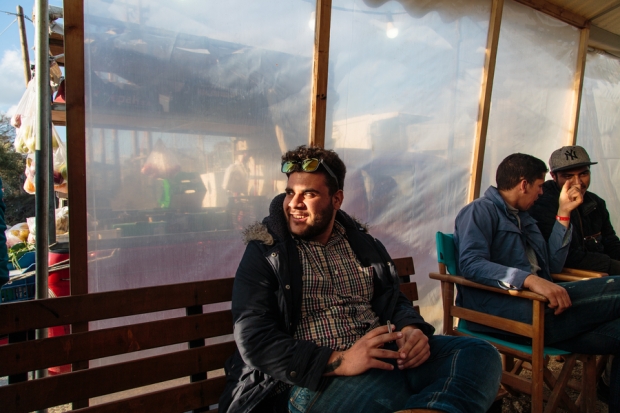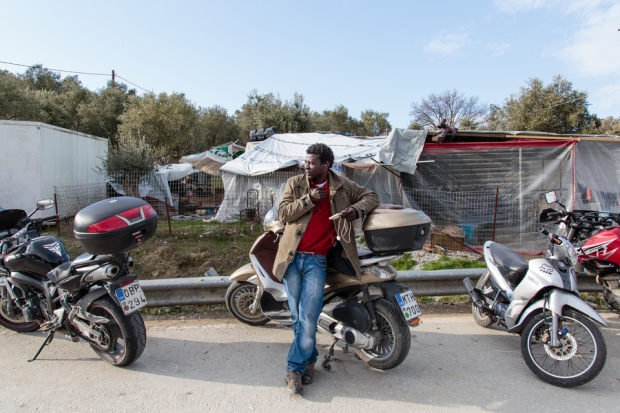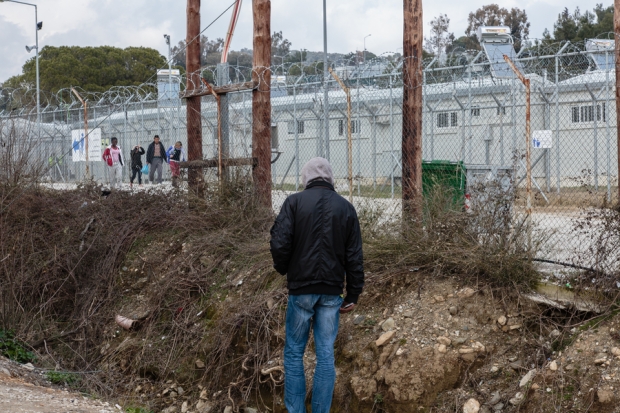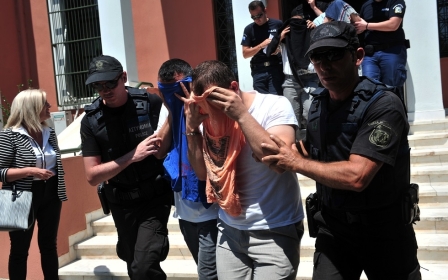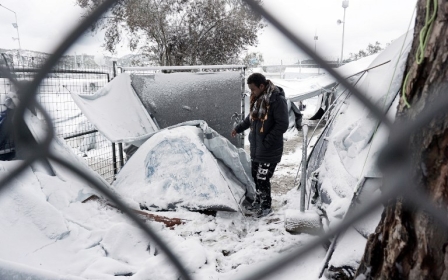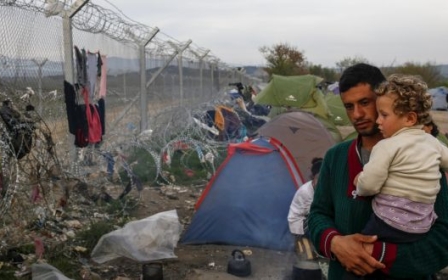'We are silently dying': Refugees in Greek camp slip into despair
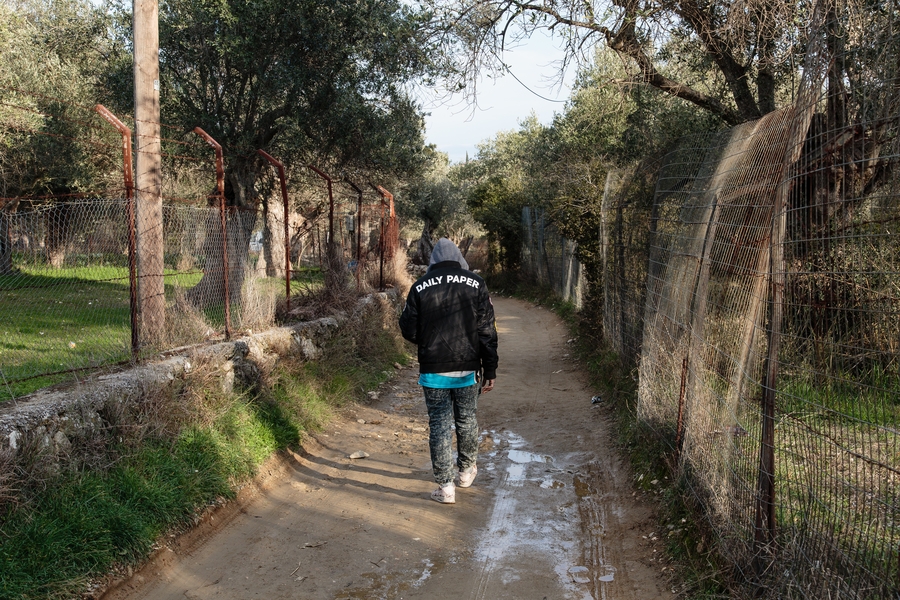
LESBOS, Greece - Poor living conditions, a sudden spate of deaths and a "complete loss of hope" are exacerbating mental health issues and leading to suicide attempts and self-harm in the Moria refugee camp on the Greek island of Lesvos, NGOs and refugees have warned.
“More and more what we are seeing is people with severe depression linked to the conditions in which they are in and to the complete loss of hope,” said Louise Roland-Gosselin, an advocacy manager for the medical NGO, Doctors Without Borders (MSF).
“[Refugees] in Moria are absolutely crushed and we hear more and more about how people are self-mutilating, how they want to commit suicide and we are aware of cases of suicide and attempted suicide, not only on Lesbos but also on other islands,” she added.
Outside the camp refugees spoke frankly of the issue. “Whenever I shave now, I think about cutting my throat with the razor,” said Ali Hannan, a refugee from Baghdad, Iraq.
Hannan said that conditions in the camp and an uncertainty over his future have led him to attempt suicide twice by overdosing on paracetamol and Ibuprofen.
The only thing that has kept him sane, he explained, is the work he provides as a translator for NGOs in the camp thanks to his grasp of Dutch and English.
“I used to help the doctors in the evenings [with translation] because the best thing you can do is to keep yourself busy, to forget the pain of the past, and not to despair and not to be depressed, just keep yourself busy. That’s what I tried to do,” he said.
The refugee camp has been the subject of intense criticism from aid organisations and human rights groups who say it is dangerously overcrowded and fails to provide basic services such as adequate shelter and hygiene facilities.
The recent death of three men in less than one week has hit refugees in the camp hard and compounded their sense of despair.
While no official cause of death has been announced, friends of the deceased and aid workers told MEE that the cause of death in all cases is believed to be carbon monoxide poisoning after heaters were brought inside tents overnight for warmth.
“When I heard about the death of the Egyptian, I was so miserable, I thought ‘this guy was very young’ so it could happen to me too,” said 27-year-old Nadjib Gorine, from Algeria, whose tent neighboured that of two of the deceased.
His pictures taken on his mobile phone from the morning of the first death show a solemn crowd gathered around the entrance to a tent. On the ground the shape of a man is recognisable underneath a grey blanket.
“People were angry for a long time before this, but they were revolutionaries when these men died, they were screaming at the authorities and [non-governmental] organisations to do something,” said al-Anny.
“These men were young...they are too young to die like this. If the conditions were better they would still be alive,” he added.
The deceased, a 22-year-old Egyptian, a 46-year-old Syrian, and a 20-year-old Pakistani, died within a week of each other.
Gulfam Hassan, 34 from Pakistan, was friends with one of the deceased men. He made clear that he believed the authorities were responsible for the deaths.
“It might be carbon monoxide that killed them but ask yourself why did they take these heaters into their tents? To keep warm, because it is freezing cold in the camp. The government are responsible for these deaths,” he said.
Greece's migration minister Yannis Mouzalas ordered an investigation into the deaths that have also prompted authorities on the island to begin clearing all remaining tents and replace them with more adequate shelters.
The deaths come after two Iraqi Kurds, a grandmother and her grandchild, burnt to death in the camp in November after a cooking stove they were using in their tent exploded.
Those deaths led to widespread anger and rioting in the camp. Al-Anny witnessed those events first hand. “They burnt the camp after they died, but unfortunately no one did anything after that,” he said.
“I carried that child who died to the ambulance, but he died. I felt guilty. I realise it wasn’t my fault but I still felt guilty. That boy had fled from war to come here and die in a refugee camp. I thought that maybe I could have done more but I didn’t,” he said.
‘Nothing to do all day’
For many of the camp's residents the long and backlogged process of applying for asylum and the lack of activities in the camp has heightened their despair.
“It’s still quite a depressing sight,” explained Roland-Gosselin. “You still have hundreds of people who are sleeping in tents, there is little access to water, hygiene conditions are not acceptable, there’s still hundreds of people without heating and they have absolutely no activity, they have nothing to do all day. So it’s an incredibly depressing place.”
Some are turning to self-harm as a result of the situation. Cutting is common in the camp according to refugees MEE spoke to.
“People here die inside, so when they die inside they either hurt someone else or they hurt themselves, that’s why they do it, to get the pain out. So they cut themselves. I’ve seen it happen to my friend. He’d cut himself, we’d bandage his arm and then he’d do it again the second day,” explained al-Anny.
Refugees can easily buy alcohol from trailers parked immediately outside the camp which also sell food and cigarettes. According to al-Anny alcohol and drug use also increased the instances of fights in the camp.
The Moria refugee camp was turned into a closed detention centre following an agreement between the European Union and Turkey. The agreement, which came into force on 20 March 2016, stipulated that all new refugee arrivals on Greek islands would be detained in closed centres and deported back to Turkey should their asylum claim be rejected.
While the agreement has apparently met its key objective of reducing the flow of refugees to Europe, the flow has not been halted completely. A restriction on refugees leaving the island has meant that numbers have steadily increased, further straining the camp’s facilities.
“[The agreement] hasn’t stopped the flow [of refugees] so we are actually seeing a situation whereby the population on the islands is actually increasing rather than decreasing over time,” said Roland-Gosselin.
Middle East Eye propose une couverture et une analyse indépendantes et incomparables du Moyen-Orient, de l’Afrique du Nord et d’autres régions du monde. Pour en savoir plus sur la reprise de ce contenu et les frais qui s’appliquent, veuillez remplir ce formulaire [en anglais]. Pour en savoir plus sur MEE, cliquez ici [en anglais].


